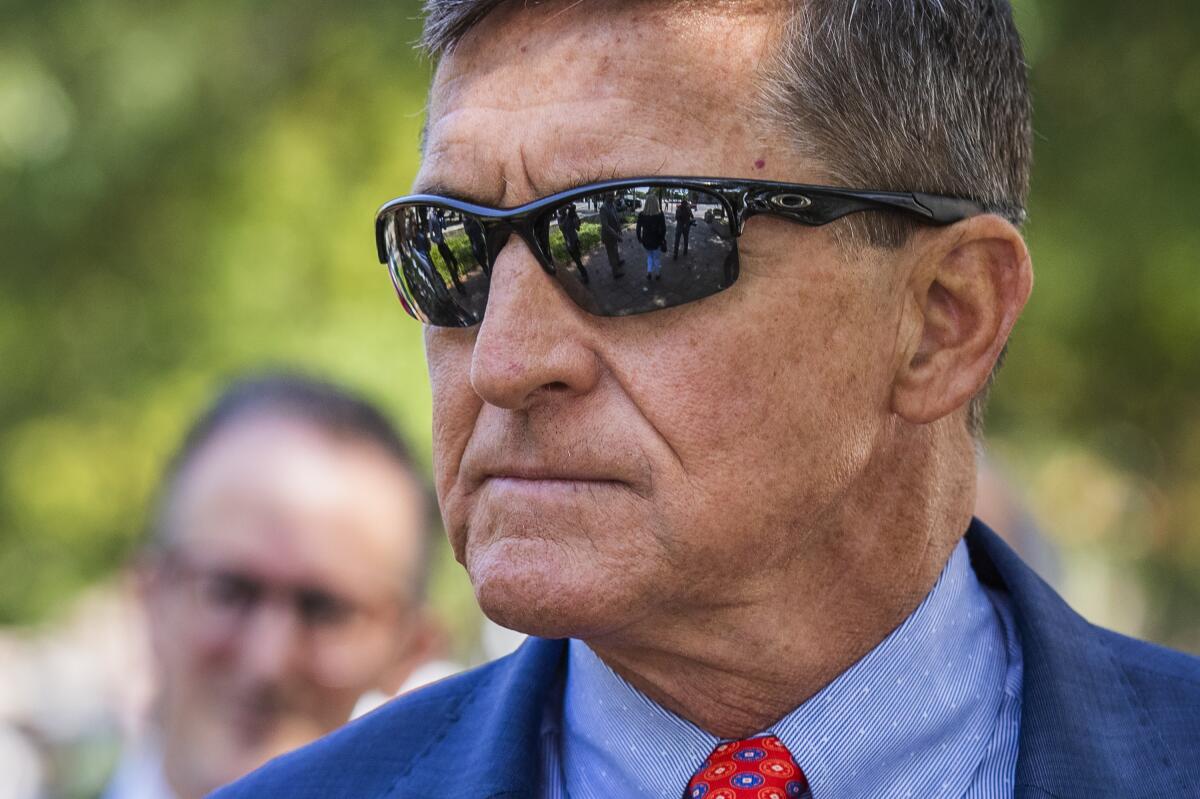A lone judge might do what Congress could not: Hold President Trump accountable

- Share via
The Trump administration — which has made a signature achievement of eluding accountability for all manner of lawless and corrupt conduct — is headed for a high-stakes showdown with a federal judge who has some very powerful cards to play.
U.S. District Judge Emmet G. Sullivan presides over the case of President Trump’s fired national security advisor Michael Flynn. Sullivan has signaled that he is, at a minimum, skeptical about the motion from the Department of Justice to dismiss the charges against Flynn, who has twice pleaded guilty to lying to federal officers about his contacts with Russian officials.
And no wonder Sullivan has doubts. The motion to dismiss was a naked political move and a betrayal of the Justice Department’s solemn obligation to pursue impartial justice. It has drawn outrage from almost all legal quarters, including from more than 2,000 former DOJ prosecutors who signed a letter saying the motion “assaulted the rule of law.”
The case against Michael Flynn, Trump’s first national security advisor, entered uncertain legal territory after the Justice Department moved to drop the charges.
Sullivan has already responded to the motion with a strong countermove that shows he is not going to permit the dismissal without at least a hard look at the law and the facts. He has appointed a highly respected former federal judge, John Gleeson, to step in and argue against it in a “friend of the court” brief due June 10.
The DOJ might not have bargained for Sullivan’s resistance. More likely, it calculated that, even if Sullivan wasn’t happy about it, he would grant the dismissal. The law requires the department to secure “the leave of the court” for such a motion. That sounds like a grant of open-ended judicial discretion, but courts have interpreted it as providing judges very little leeway to reject the government’s decisions to dismiss charges in a criminal case.
Still, Sullivan doesn’t have to deny the motion to make trouble for the department. He could order an evidentiary hearing to evaluate the motion’s chief contentions, and that would not be a pretty day for the department. It could result in making public the transcripts of the calls between Flynn and the Russians. The department claims the conversations were innocuous and pro forma; the smart money suggests otherwise.
Sullivan has far more potent options, though if he deploys them, he can expect the Justice Department to fight him tooth and nail.
He could simply deny the government’s motion and proceed to sentence Flynn, which would have been the next step in the case if the government hadn’t dropped its dismissal bomb. That, however, would go against the grain of federal court rulings, in particular from Sullivan’s own D.C. Court of Appeals, which specify that dismissing criminal charges “lie[s] squarely within the ken of prosecutorial discretion.”
But Sullivan needn’t deny or attack the principle of prosecutorial discretion; he can simply deny the motion on the grounds that the government’s arguments don’t hold water. The DOJ claims there is new evidence that supports dismissal, but none has been cited. It says there was no basis for questioning Flynn in the first place, but the predicate for suspecting Flynn is clear — the intercepted phone calls — as the department’s own inspector general expressly found.
Most importantly, the department claims Flynn’s lies aren’t “material,” or important. But materiality is something the judge determines, and it’s manifest here because the lies were about patently serious matters of state.
It is alleged that Flynn told the Russians to ignore Obama administration sanctions imposed on them in retaliation for their interference in the 2016 election, indicating Trump would later undo them. He also urged Russia to vote against a U.N. resolution condemning Israeli settlements, according to the criminal complaint. Then Flynn denied those conversations to the FBI. His rogue diplomacy with the U.S’ chief geopolitical adversary was flagrantly improper, and his lies exposed him to blackmail by Russians who could prove his dishonesty.
Sullivan’s final hole card is potentially the strongest. He has asked Gleeson to address whether Flynn should be held in criminal contempt for perjury. That is an action a federal judge can initiate without the involvement of prosecutors from the Department of Justice, and there is plenty to support it in this case.
Flynn filed a 50-page motion in January, attaching a personal declaration stating that he was innocent, had not lied to the agents and “didn’t remember” if he and Russian envoy Sergey Kislyak had discussed sanctions of the U.N. vote. The exact opposite, in other words, of what he had previously sworn to in elaborate detail twice before Sullivan.
The Justice Department will no doubt respond ferociously if Sullivan moves to sentence Flynn or to prosecute him for perjury. We can expect a motion to force the judge to recuse himself, or motions to “mandamus” him, that is, to put his rulings immediately before the Court of Appeals. And the president always has the ultimate trump card of a Flynn pardon, but presumably a chief reason for the department’s motion was to keep Trump from having to deploy that politically costly gesture in an election year. As time drags on with evidentiary hearings or appeals, the pressure increases on the president.
If he elects to use the the power at his disposal, one judge could accomplish what Congress, multiple inspectors general, and a majority of the electorate have not been able to do — hold the president and his allies accountable for their contemptuous disregard for the rule of law.
Harry Litman is a former U.S. attorney. @harrylitman
More to Read
A cure for the common opinion
Get thought-provoking perspectives with our weekly newsletter.
You may occasionally receive promotional content from the Los Angeles Times.









